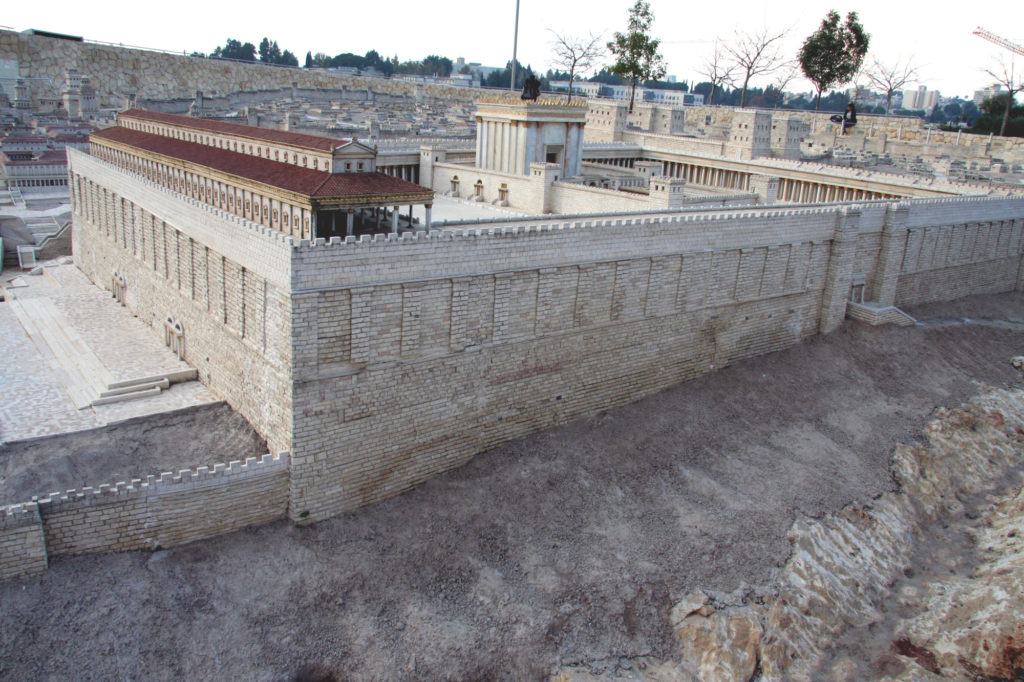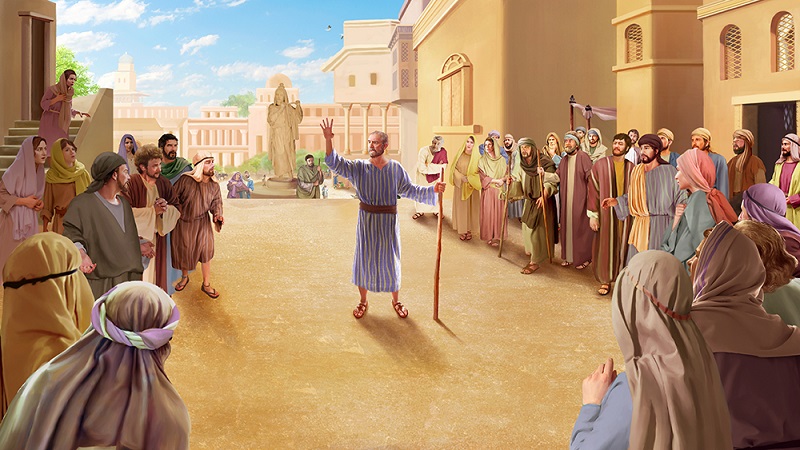Readings: Jeremiah 7:1-11 | Romans 9:30-10:4 | Luke 19:41–48
Text: Luke 19:41-48
Zeal can be a beautiful thing. I have to say it is exhilarating being at Higher Things in the worship services with hundreds of voices exultantly singing beautiful, poetic meditations on the Word of God. With our voices declaring the mighty works of God, and singing with joy from the heart what our own experience of the Gospel has been.

Zeal is an inspiration. Although I haven’t had the chance to experience it personally, I believe it would be electrifying to be part of a march in support of life. How inspiring and encouraging it is to see so many Christians gathered together to advocate for the unwanted lives, the outpouring of love there must be to bring open hearts and arms for pregnant women in perilous circumstances, to shine the light of God when the rest of the world would tell them that it’s no more than a medical condition which can be solved by a bloody procedure. And what a joy to see fifty years of labors bear fruit in having the Supreme Court overturn its previous decisions.
Zeal is invigorating. As we often ask God in the Divine Service to “strengthen newly established congregations, and support them in challenging times. Make them steadfast, abounding in the work of the Lord, and let their faith and zeal for the Gospel refresh and renew the witness of Your people everywhere.” What a joy it is to see mission congregations planted in new or changing communities here in our country. How awesome it is to hear of the Church abroad where droves of people leave the religions of their fathers—animism, Islam, Hinduism—and come to believe in the True God and line up to be baptized.
But like everything our sin touches, zeal can be used selfishly without a thought for God. This is what our Lord is confronting with His people Israel in today’s texts. In Jeremiah’s time, they boasted of lineage, of temple, of blood descendance from David and the sons of Levi. In the time our Lord came in the flesh, it was of the strict devotion of the Pharisees, the temple observances of the Sadducees, the perseverance of the Essenes, the temple rebuilt under Zerubbabel. Even after Jesus came and accomplished His saving work—not just for Israel, but for all the families of the earth—and you hear in the Epistle how the Jews stubbornly rejected the God in which they boasted.
But as the Apostle to the Hebrews puts it succinctly: “Without faith it is impossible to please [God].” (Heb. 11:6). All the zeal one can muster, apart from the Lord cannot please Him, no matter how much it might be right in our own eyes or the eyes of those around us.
So, one of the first things Jesus does after coming into Jerusalem (the city in which the Jews took so much pride as the city of David) was to lament over the Jews’ lack of faith. It’s hard for us to draw the lines simply by looking at their works. After all, the Pharisees were the most observant to the Law of Moses that any Israelites had been since the days of Joshua. The Sanhedrin saw to enforcing the strictest of purity requirements. The Temple had enough income to keep it in spotless repair and the priests carrying out their many responsibilities. So, by all appearances, it was a golden age for Judaism.

But the Lord Himself has this against them: “Would that you, even you, had known on this day the things that make for peace!” Peace, or any Hebrew speaker, Shalom. Aren’t they in the city of peace itself?[1] Do not the sons of Aaron put God’s Name on the sons of Israel saying, “The Lord lift up His countenance upon you and give you shalom?” (Num 6:26) If anyone should know the Lord’s shalom, it should be them!
But their religion has become unhinged from the Lord who gave it to them. They came up to Jerusalem yearly for the Passover, singing:
7 Peace be within your walls
and security within your towers!”
8 For my brothers and companions’ sake
I will say, “Peace be within you!”
9 For the sake of the house of the Lord our God,
I will seek your good. (Ps. 122:7-9)
But to them, those words meant the city itself, its walls, the temple buildings. The peace is not to be found in absence of enemies, but in the one who stands there—the Messiah, Jesus. It’s only through Him that true shalom comes from God, a shalom that flows from the cross where Abraham’s offspring was offered up for all people.

Where Jesus goes next is their other source of pride: the Temple. Starting with David, there was a pious desire to build a permanent house in which the Lord would be (2 Samuel 7). In some Christological double-speak, the Lord told David, “I will raise up your offspring after you, who shall come from your body, and I will establish his kingdom. 13 He shall build a house for my name, and I will establish the throne of his kingdom forever.” (2 Sam. 7:12-13) And it was fulfilled in the time by Solomon, who constructed a tremendously ornate building, a hint at a return to the Garden of Eden, nearly everything inside the Temple of Solomon was plated with gold. After falling into disrepair that corresponded to their unbelief, this temple was utterly destroyed in 587 BC. They returned, according to God’s promise after 70 years, and were allowed to rebuild the Temple. Yet, Zerubbabel’s temple was a poor substitute. Herod the Great strove to make the Temple magnificent again, and it was a belief held, even by Jesus’ disciples, that they were approaching the former splendor.
Yet what does the Lord think of this edifice? “He entered the temple and began to drive out those who sold, 46 saying to them, “It is written, ‘My house shall be a house of prayer,’ but you have made it a den of robbers.” There was more of a problem than not having the glory cloud, or the Ark of the Covenant. Their practices, for as ornate and well-financed as they had been, were vain and deplorable by the Lord. They still did point to the Lord being approached by the blood of the sacrifices, but for the Jews, they wanted the building more than the true Sacrifice which would cleanse them. As St. Paul writes, “being ignorant of the righteousness of God, and seeking to establish their own, they did not submit to God’s righteousness. 4 For Christ is the end of the law for righteousness to everyone who believes.” (Rom. 10:3-4)
The Lord also says something rather unnerving: “But now they are hidden from your eyes. 43 For the days will come upon you, when your enemies will set up a barricade around you and surround you and hem you in on every side 44 and tear you down to the ground, you and your children within you. And they will not leave one stone upon another in you, because you did not know the time of your visitation.”
“But now they are hidden from your eyes”? You might think this is unfair of God. If He wants to be found by all people, why would He hide such things from them? In faith, we acknowledge that the Lord is wise in His ways, “For as the heavens are higher than the earth, so are my ways higher than your ways and my thoughts than your thoughts.” (Isa. 55:9) Is this not the humbling which He knows they need?

Compare this to the preaching of Jonah. Jonah came to Nineveh, and preached, “Yet forty days, and Nineveh shall be overthrown!” And how did the people, these uncircumcised, respond? “And the people of Nineveh believed God. They called for a fast and put on sackcloth, from the greatest of them to the least of them.” (Jon. 3:4-5) Yet, when the Lord in the flesh preaches the same kind of sermon, what do the people of Jerusalem do but “seek to destroy Him.” Where the Word of God has its proper effect, it works repentance in sinners. It lets God in His words and blameless in His judgments (Ps. 51:4). It also lets God entirely be the One who can save, the One by whom we live, and the One by whom we pass through judgement by the merits of Jesus Christ.
We may not be Jews or live in Jerusalem, but these warnings continue to be apt for God’s people of the New Testament. Often, we find ourselves believing that our walk before God is simply a matter of our effort. We need to be thoroughly debased of that notion, lest the Christian Church become a thing without Christ. You see this in churches that are so focused on what they’re doing, pressuring each person to “get involved” and “commit.” Soon, it’s not so important what a person believes about Jesus and their life of repentance and faith, so long as they’re doing things “for the Lord.” And you can be sure this kind of religion gets results—it brings people out (for a time), gathers the money (by holy guilt trips), and it claims to glimpse what the church “really should be like.”
But like the Jews of Israel, we need that humbling from the Lord that it isn’t about us and what we can do. The people of God forever rely on what He can and does do.
Personally, we might believe that our life could go better, simply if we made the right choices. In our faith, we think if we just drummed up more zeal to read our Bible, spent more time on our knees in prayer, if we gave a certain percentage more… We also sometimes believe this about our day-to-day lives. If we just adopt the smartest financial plan, then we’ll really be in charge of our destiny. If we find just the right diet, we’ll avoid disease and live longer. If we change our parenting in the right way, our children will be obedient and never run into trouble.
It’s not that these aren’t all good things. Zeal for your walk with God is good, just as zeal for caring for the life God has given you. It’s that our sinful hearts insert pride, and (like the Jews) think we’ve gotten more control than we really have.

What really counts is the foundation of all of it: hearing the Word of God in faith. Let the Lord Jesus be what His title says, and let His Word do to you what it needs to do. As He said to the church in Laodicea, “Those whom I love, I reprove and discipline, so be zealous and repent.” (Rev. 3:19) And let Him grant the success and increase, firmly believing that “you are in Christ Jesus, who became to us wisdom from God, righteousness and sanctification and redemption, 31 so that, as it is written, ‘Let the one who boasts, boast in the Lord.’” (1 Cor. 1:30-31)
47 And he was teaching daily in the temple. The chief priests and the scribes and the principal men of the people were seeking to destroy him, 48 but they did not find anything they could do, for all the people were hanging on his words.
For the Jews, the Lord showed His love by continuing to preach to them, knowing that it will accomplish that for which He sent it. It’s the same for us in the Church today. His Word has the power it needs to bring the straying to repentance, to ignite those who are cold, and to empower a right zeal for the Word of God and the Gospel of salvation.
We thank God for His steadfast love. His steadfast love [see Psalm 136] is His faithfulness to the covenant He made with the Blood of His Son, on the day when He visited the world and offered up the sacrifice no sinful priest could: Behold, the Lamb of God who takes away the sin of the world! Behold, Christ, your paschal lamb has been sacrificed. And He has continued to preach that Word which kills our sinful flesh and makes us alive before God. It is a Word which makes us dead to the fleshly ideas of Shalom, of Sanctuary, of Church. It enlivens us to find peace in the pierced hands of the risen Jesus, sent to us, who says: “Shalom! Peace be with you!” (Luke 24:, John 20:19); to find the house of the Lord “where two or three are gathered in His Name” (Matt. 18:20) where His Word is preached and taught with joy, and His mysteries are honored.
Thanks and praise be to the Lord our God! In the Name + of Jesus. Amen.

[1] Jerusalem roughly translates to mean “Where peace has been cast” (See also Heb. 7:1-2)
Leave a Reply